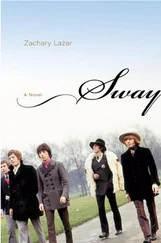They sat at joined tables — the Lanskys and her family, the Citrons — her brother Jules in a silk tie and beige suit, across from him Meyer’s mother staring absently through thick lenses. Waiters in vests brought blintzes, sour cream, whitefish, borscht. She watched the plates go by without appetite. She knew so many things now. How the garage on Cannon Street was more than just a garage. How Meyer and Ben owned property like it all over the city and in New Jersey and Philadelphia. How they imported whiskey from Scotland on ships they chartered themselves and then distributed it across the United States to wealthy businessmen, even politicians. Her friend Esta, Ben’s girl, had told her this. Esta, the brassy one, her lips clenched in the moment before she burst forth with the secrets, what Ben had told her after their date at the French Bakers or Manny Wolf’s restaurant, the movie, or the pleasure drive in the Gardner coupe or the Dodge Brothers sedan.
She watched her father frown his way through two plates of food, a squat man in a scuffed hat. Meyer bowed his head and didn’t speak, the lunch a duty to be gotten through. When it was over, he reached into his pants pocket and discreetly gave one of the waiters money without asking for a bill, placing his hand on the man’s shoulder as he bent down. Everyone saw, had been waiting for it. Her father endured the moment with a scheming stare at the dish of cream that still remained on the table. She had never imagined her father capable of jealousy. As they were getting up to go, he took Meyer aside and they talked in the tiny space between the table and the bathroom, Meyer’s topcoat draped over his arm, a young man with money, an old man giving him trite advice.
“He asked if I wanted a job,” Meyer told her afterward. “Out in Hoboken at the store. I said of course, sure, I’d be honored.”
She turned, holding him in her squint. They were parked outside the tenements they’d both grown up in, bedding slung from the fire escapes. A thick crowd parted passively around the car with their bundles and sacks, none of them looking in the windows, Anne in her old Butterick dress, Meyer in his coat and hat and gloves.
“I’ll help him with the accounting, the books. A couple days a week. He’s your father.”
She looked down at the ring on her finger. For a startled moment she’d pictured Meyer standing at the counter in an apron. Already she’d begun to imagine an apartment far uptown with high windows, carpets, chandeliers. Not just to imagine it but to think of it as rightfully hers.
Buds on the trees as they crossed the Hudson and followed the highway north into Westchester, Rockland, Orange. The cliffs sheared down to the river, the great pale trees growing in the ledges of the rock. She had never seen so much space, so much light. They drove all the way to the Canadian border, through a wilderness without buildings. America — a honeymoon. A girl from a tenement with a damp latrine in the hall, a common sink, floorboards shiny with kitchen scraps and muck.
II
A fifth of Dewar’s, bought for two dollars, sold for more than thirty — a fifteen hundred percent profit when just the year before the Dewar’s had been legal. A fifteen hundred percent profit on something more and more people openly wanted, and you were eighteen and you had left school to work in a tool-and-die shop for ten cents an hour, fifty-two hours a week. Three thousand speakeasies in New York City alone. In Grodno, his mother had taken music lessons. They had lived in a stone house in the center of town. Bright lights in the machine shop, the thud of the punches, men in coveralls at the lathes.
III
He stood and took the call in the suite’s bedroom, pressing his free ear shut with two fingers, looking at the dark blue of the windows on the south side of Central Park. He made a visor of his hand against the glass and saw the damp streets in the lamplight. It was Anne again, saying she thought the baby was coming.
“It’s very early,” he said. “It’s three months early.”
“You don’t understand. It’s coming now.”
“You’re not bleeding, are you?”
“Meyer.”
He lit a cigarette and scanned the nightstand for the ashtray. He told her he’d be home in a few minutes, then he hung up. In the next room, they were all seated among the furniture, the pale linen wallpaper, the silver service trays on the sideboard and the low table. He looked past the men in their hats to the front hallway with its chandelier and vases, like the foyer of a town house.
“You look pale,” his friend Charlie Luciano said. His white shirt was ample, brilliantly clean, and with the sleeves rolled up and the collar open without a tie it implied an abundance of other shirts just like it or even finer.
“She’s having a rough time,” Meyer said.
“What other kind of time is there?”
They went back into the bedroom to speak in private. They spoke almost entirely in numbers, the floor lamp in the corner casting its stale halo of light over the wing chair.
“Not much discussion in the other room,” Charlie said. “Even if they’re talking out there now, they’re not really thinking about anything but that closed door, us on the other side of it.”
“I’m not worried about them,” Meyer said.
“They’re making money.”
“Even Anastasia. Genovese.”
“They’ve got their qualities. It’s just that they’re not good ones.”
They were all Italians in the other room. Unlike Charlie, most of them never denied how much they liked the taste in their mouths of the word “kike.”
She was standing in her nightgown at the stove. He watched from the doorway in his hat and coat, having called out her name and received no answer. A bare bulb hung from a coil in the ceiling and shone down on her back, her feet swelling over the edges of her slippers.
She shivered and convulsed against his chest, his hands on her shoulders. Holding her now was unsexual, confusing, hopeless. The milk on the stove was starting to boil. He didn’t know how to get through to the moment when he could let her go and shut off the flame. Instead, she turned away from him and threw the pot across the kitchen at the wall.
She’d thought the baby had died that August, ten weeks in. Her breasts weren’t tender anymore, she wasn’t queasy — in the bedroom she’d looked at her bare stomach and started weeping, afraid at first to even touch it. She’d called him home and he’d taken her to the doctor and the doctor said it was common, everything was fine, but then the worrying began. In the humid August days, she would lie in bed with a damp cloth on her face and a fan set on a chair, falling in and out of sleep, the plate of toast on the sheets beside her, the fan watching like a metal eye. The nausea returned. He didn’t know what to do for her. She would sit on the edge of the bed as if she was trying to imagine standing up.
A small temporary place in Brooklyn. He was superstitious in this way — you couldn’t set up a baby’s room until it was born and safe and you knew it would be all right. He went even further. Until the baby was born, they would live in a two-room apartment in Brooklyn with plaid chairs and a broken radio and someone else’s books on the shelves.
He’d fallen asleep in the sitting room and so he was still dressed when the door buzzer went off around 3:00 a.m. He met Ben Siegel in the stairway and Ben looked up, his tie pulled to one side between the lapels of his double-breasted suit. A thin blond beard showed in blotches at his sideburns and cheeks, almost an adolescent’s beard.
“They didn’t call you?” he said.
“No.”
“They said they called. I said if they called, why didn’t they talk to you?”
Читать дальше












